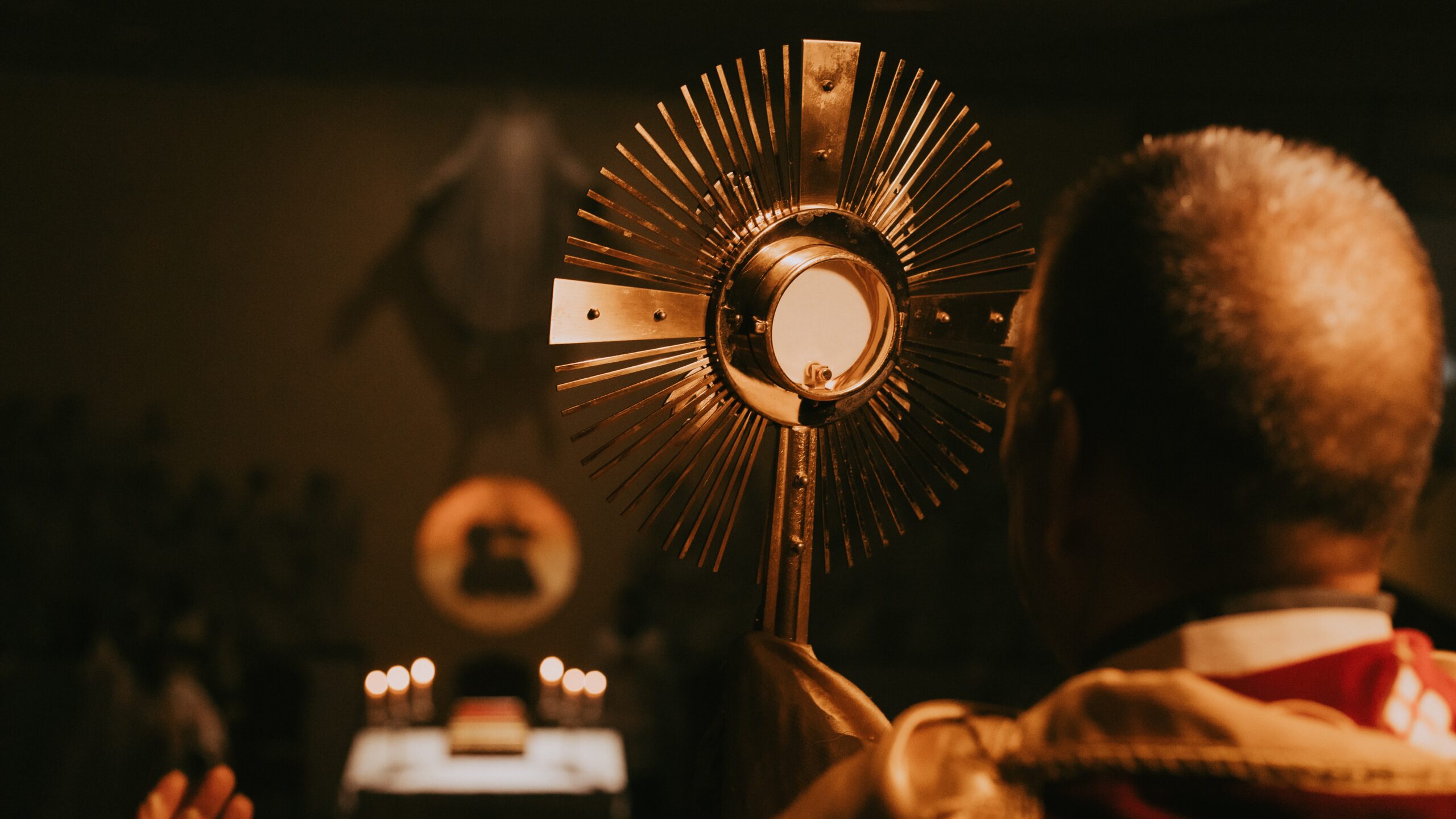In the dark days of the Arian heresy, two saints used hymns as a means of protecting and revitalizing the faith of others. Since Arius used hymns to promote the heresy, St. Ephrem the Syrian wrote orthodox hymns using the same melodies, teaching the truth in place of error. And when his cathedral in Milan was threatened by Arian forces, St. Ambrose occupied it with his flock in a kind of early Christian lockdown, and according to St. Augustine (Confessions 9.7.15), taught them to sing hymns of his own composition.
Faced with a heresy of our own—the lack of faith in the Real Presence among Mass-going Catholics—how should our hymns be written if they are to encourage Eucharistic faith?
As the author of three hymns for the Eucharistic Revival—for the Diocese of Birmingham, the Archdiocese of Detroit, and the USCCB—I have given this question a great deal of thought and have developed the following convictions about the purposes of Eucharistic hymnody.
A good hymn about the Eucharist acknowledges this upward motion, the will of the Father, and the key role played in this plan by the Eucharist.
Foster faith in the Real Presence
Hymn writers must proceed with a great respect for the mysteries of the faith because hymns are written for others to sing to God. Writing words of prayer that will be used by others is an enormous responsibility. The words of hymns should not only speak the truth but should have the ring of truth, helping others to receive God’s gifts more readily and firmly. Like preaching, hymns at their best use rhetorical elements to achieve their aims. In our time, one of the key tasks of hymns is helping others catch hold of the reality of the gift of the Eucharist in all its dimensions.
Promote trust in the “plan of God”
The Eucharist does not stand alone but is the crowning jewel of the master plan of God for human salvation. Like all the mysteries of grace, the Eucharist gives human existence an upward momentum that infinitely exceeds any natural human ability to achieve. Allowing ourselves to be caught up into this trajectory is a challenge for human nature to accept—but it is the key to happiness. The mysteries of the Creed are not cold, abstract propositions but life-giving realities that affect our lives on the deepest level: “For us men and for our salvation.” A good hymn about the Eucharist acknowledges this upward motion, the will of the Father, and the key role played in this plan by the Eucharist.
Stir up a hunger for heaven
Participation in the Eucharist is our highest activity on earth, the source and summit of the Christian faith. However, it does not end in itself alone but God, as we hope to enjoy him some day in heaven. The desire for heaven can seem foreign to everyday human life with all its demands. This is where Sunday Mass can raise the bar and lift our eyes. Because hymn texts are linked to music, with its ability to affect us suprarationally, they can reach the appetites and direct our longings. Jesus came not only to elevate our quality of life but our quantity of life, making us share in the Trinitarian immortality by the eventual resurrection of body and soul. Without the resurrection, according to St. Paul, our hope is vain.
Unleash the power of Scripture
Reading ancient Fathers like St. Augustine, one is struck by the fluid incorporation of scriptural passages that illustrate theological points. The same is done in our best hymns. Consider the opening half stanza of a popular hymn:
At the Lamb’s high feast we sing
Praise to our victorious King.
Who has washed us in the tide
Flowing from his pierced side.
These four lines powerfully reference the heavenly liturgy described in Revelation, the crossing of the Red Sea in Exodus, and the Crucifixion account in John’s Gospel. Notice how compactly this is done and how the images are reinforced for the memory by rhyme. Notice, too, how the fresh expression “tide” for the blood and water flowing from Christ’s side is teased into being by the demands of the rhyme structure. The Scripture, quite old, is made new for us by its inclusion in this exemplary hymn.

Great hymns that follow these principles spur us forward with great encouragement, engaging the whole person—mind, heart, soul, and strength—in praise of the divine Persons, especially Jesus Christ, fully present Body, Blood, Soul, and Divinity in the Blessed Sacrament.
Great Eucharistic hymns also avoid several inadequacies—hymns that focus on human community at the expense of the divine initiative, for example, or that challenge doctrine in general or individual articles of the faith in particular. And at this time, one of those historical eras during which Eucharistic faith is at a low ebb, perhaps it would be safest to avoid entirely singing hymns that speak of bread, wine, grain, or grapes. Even when the words to hymns using these expressions come directly from Scripture, they can mislead. For example, a hymn that sings of “this bread” while people are going to Communion may not be clearly enough referring to the Eucharistic Presence of the Lord, who is himself the Bread of Life.
